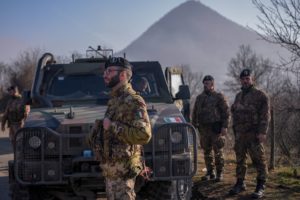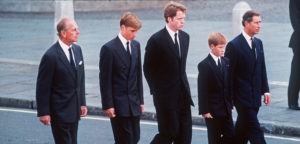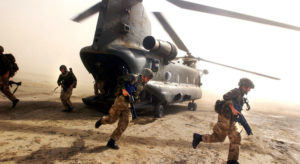When a civil servant first suggested to Tony Blair that he needed to be aware of the evolving situation in Kosovo, the prime minister’s response was much the same as anyone else’s would have been: “You’d better give me a note on it. Starting with: where is it?” Even now, a quarter of a century on from the outbreak of the Kosovo War, few of us could answer accurately.
Kosovo then was a province in the south of Yugoslavia, a landlocked area slightly smaller than the Falkland Islands. It was officially part of Serbia — the largest of the Yugoslav republics — but was heavily disputed: 90% of the population were Albanian by ethnicity, Muslim by faith. And Kosovo had, for differing reasons, a revered place in the histories of both Serbia and Albania, integral to each’s sense of national identity. As George Orwell noted in 1945: “Yugoslav politics are very complicated and I make no pretence of being an expert on them.”
The Kosovars were a small minority in Yugoslavia, who had long faced discrimination, and long sought independence. That had seemed an implausible hope, but by the time the province came to Blair’s attention, things were looking very different. In the first half of the Nineties, Yugoslavia had been ripped apart, with Slovenia, Macedonia, Croatia and Bosnia splitting to become independent countries, the latter two after wars of a bloodiness not seen in Europe since 1945. The Kosovars were still a minority, but — with Yugoslavia reduced from six constituent republics to just two, Serbia and Montenegro — they now made up a fifth of the country’s population. Not so small anymore.
In 1995, the Kosovo Liberation Army (KLA) began armed actions; by 1998, the insurgency had escalated into serious conflict. The Yugoslav military was attempting to suppress the KLA by terrorising the population: hundreds were killed, thousands raped, and hundreds of thousands displaced. This was the point at which the situation forced itself into the international spotlight, provoking a sense of horrified déjà vu: the earlier Yugoslav Wars had cost the lives of up to 150,000, and made the term “ethnic cleansing” common currency. Many in the West were, retrospectively in some instances, feeling ashamed that such destruction had been allowed to run rampant in Europe. Then, the United Nations had tried to contain the killing with an arms embargo and the deployment of some ineffective peacekeepers; mostly they had looked on sorrowfully. And now it was happening again.
“I saw it as essentially a moral issue,” wrote Blair in his memoirs. There was a humanitarian disaster unfolding, and — as in Ukraine today — the blame lay at the feet of one man: in this case the president of Yugoslavia, Slobodan Milošević. Action was needed. By June 1998, Britain was talking with its Nato partners about the possibility of an air and land operation; it was another nine months before, in March 1999, Nato began bombing Yugoslavia. “We have learned from bitter experience not to appease dictators,” explained Blair, who largely drove the initiative. “We tried it 60 years ago.”
There was — again, as today — political consensus, with backing for the government’s actions from the Conservatives and the Liberal Democrats, then led by William Hague and Paddy Ashdown respectively. Even Blair’s own party was mostly in support. A few on the Left pointed out that the lack of UN authorisation made the bombing entirely illegal, but a motion condemning Nato’s actions was signed by just six of the usual suspects, including Tony Benn, Jeremy Corbyn and John McDonnell. Notably absent was Ken Livingstone, who joined Blair in comparing Milošević to Hitler. Robin Cook and Clare Short — who would both later resign from the cabinet over Iraq — were fully on board, the former as foreign secretary, the latter dutifully doing the media rounds to defend the government.
Television news played its part in preparing the public for military action, with extensive coverage of the appalling suffering being endured by the Kosovars. In the press, the most notable cheerleaders were to be found at the Guardian. As early as April 1998, an editorial was calling for “intervention if only on humanitarian grounds” and for “the deployment of troops”. On the eve of the bombing, the leader column was headlined: “The sad need for force.” We have become familiar with that sense of sorrowful necessity in the last 12 months.
It was confidently predicted that 72 hours of bombing would be sufficient to force Milošević into retreat. That didn’t happen, and the days stretched out into weeks and months. Along the way, there was a series of Nato errors: the accidental strike on the Chinese Embassy in Belgrade; a cluster bomb aimed at an airfield that hit a market, killing more than 60 Serbian civilians; the deaths of 87 Kosovar refugees in a bomb attack on the village of Koriša. In the face of these blunders and the absence of a swift victory, Blair ramped up the moral rhetoric: “This is no longer just a military conflict. It is a battle between good and evil; between civilisation and barbarity.” To prove the point, Milošević was indicted for crimes against humanity by a UN tribunal.
But the public was losing faith. Although an early opinion poll showed two-thirds supporting the use of ground troops, the Labour Party’s own focus groups reported far less enthusiasm. At a time when public spending was still under tight control, people wanted to know, why was money being spent on waging war? Philip Gould, Blair’s much-trusted pollster, urged him to ignore the findings and carry on, but press secretary Alastair Campbell was furious with the electorate’s lack of gratitude: “It made you wonder why we bothered sometimes.”
In the event, it took 78 days before Milošević agreed an unconditional withdrawal of Serbian troops, and even then, it was Russian diplomacy and the threat of a Nato land invasion that proved decisive. There was a limit to what bombing alone could do (as Martin McGuinness of the IRA helpfully pointed out). Nonetheless, the operation had achieved its objective. Indeed, it went further. So damaged was Milošević’s standing among Serbs that the following year he lost the presidential election and was dragged from office. (He was subsequently extradited to The Hague to face charges of war crimes, dying before the trial could conclude.) Regime change had not been the war’s aim, but it was achieved.
Insofar as Kosovo is remembered, it’s seen as, to use Blair’s description, “a just war”. The comparisons between Yugoslavia and Nazi Germany were historically illiterate — and tone-deaf, given the history of the country in the Forties — but there was a clear aggressor, who everyone agreed had to be defeated. It was also, from a British perspective, a clean war. There were around 13,500 dead, most of them civilians, but Nato had no combat fatalities at all. And it was welcomed by those in whose name it was being fought. Hundreds of thousands were displaced, but it was notable that they blamed Milošević, not Nato. The Kosovars were overwhelmingly in favour of the military intervention, and Blair in particular was seen as a hero. When he visited the capital, Pristina, a few weeks after the cessation of hostilities, he was greeted by huge crowds, chanting his name, waving Union Jacks and presenting him with flowers. “Tonibler” and “Bler” became popular names for male children born in Kosovo that year (as with the Kosovan footballer Bler Thaçi).
“War is never civilised,” said Blair in his moment of triumph. “But war can be necessary to uphold civilisation.” It was the kind of paradox that appealed to him and was so integral to his oratory: the civilising war, the imposition of democracy. The victory, he believed, confirmed his “doctrine of international community” — which he outlined during the conflict: those with military power, he argued, had the right, indeed the duty, to intervene where possible against “a despotic, dictatorial regime”, even if there was no “immediate threat to our interests”.
It was the philosophy that later fed his fervour for the invasion of Afghanistan in 2001, and of Iraq in 2003. There was the same talk of good and evil, of how we should never appease dictators; the same predictions of swift success. And in the case of Iraq, there was a similar failure — much more controversially this time — to get UN backing. But by now, Blair was, said Labour’s ex-deputy leader Roy Hattersley, in a “messianic mood”.
Neither of those ventures, of course, ended well. There was no repeat of the welcome in Pristina, and the unforeseen consequences were catastrophic. The destabilising of Iraq led to the emergence of Islamic State; Afghanistan reverted to Taliban control as soon as western troops departed. Nor was Nato’s later bombing of Libya in 2011 any more positive: Muammar Gaddafi was overthrown, but then another, longer and more costly, civil war broke out. All are, by any normal measure, failed states. The Foreign Office currently advises British citizens not to travel to Afghanistan, Iraq or Libya.
It also advises against all but essential travel to northern Kosovo, and there’s a warning for the whole country: “Terrorists are likely to try to carry out attacks.” Media attention has long since moved on, but even with the continuing presence of KFOR — the Nato-led peacekeeping force, now much reduced in numbers — Kosovo is still not stable. Maybe that was inevitable. In public, this was “a battle between good and evil”. In private, Blair acknowledged that “the KLA were not much better than the Serbs”. The Nato victory was followed by Kosovan retaliation. There was an exodus of Serbs and Roma in a further wave of ethnic cleansing; churches were attacked, just as mosques had once been; and there have been frequent outbreaks of violence over the years: more than 200 KFOR personnel have lost their lives.
There have also been knock-on effects internationally. In 2004, Amnesty International published a report revealing how women were being trafficked into the province from Albania to work as prostitutes, meeting the demands of the 50,000 peacekeeping troops stationed there. And it wasn’t just adult women. “I was forced by the boss to serve international soldiers and police officers,” a 12-year-old Albanian girl told the researchers. Amnesty concluded that the UN and Nato forces were “not only failing to protect the human rights of the women and girls, but are in many cases themselves using them for sexual gratification and are even allegedly involved in trafficking itself”.
By the time the report was released, the sex industry created for KFOR had grown, becoming the centre of a network that sold woman and girls into prostitution in western Europe — 1,400 were being smuggled into Britain every year, it was estimated. When in 2005 ex-cabinet minister Harriet Harman analysed the successful prosecutions for people trafficking, she concluded that, “in nearly every case the culprit was Albanian or Kosovan, some of whom had been allowed in as refugees”.
The legacy of Kosovo was also seen in the transformation of Nato, now an organisation prepared to initiate war beyond the UN: a fact that ensures Kosovo still has traction in Russian propaganda. Answering western criticism of the invasion of Ukraine last year, Russian foreign minister Sergey Lavrov was quick to talk of Nato’s “illegal use of force” in 1999. And, in the context of Ukraine, it’s hard not to see Blair in Pristina as the model for Boris Johnson, or indeed Keir Starmer, in Kyiv. (How envious they must be to see all those Toniblers.) Adoring crowds and moral certainty are a seductive combination, particularly for a politician feeling a lack of honour in his own land.
Ukraine, of course, is not Kosovo. In one sense, the argument today is even more clear-cut: Ukraine is an independent, sovereign nation, whereas Kosovo had no such status. (Indeed, it is still not recognised by all member states of Nato.) The Yugoslav claim that its forces were suppressing an internal terrorist threat carried some weight; the same is evidently not true of the invasion of Ukraine. The real difference, though, is the nature of the opponent. Blair’s interventionism depended, he said, on answering the question: “Are there military operations we can sensibly and prudently undertake?” Nobody seriously thinks that Nato taking on Russia directly is either sensible or prudent.
Nonetheless, the rhetoric remains, despite all that has happened since Kosovo. The Ukraine War is seen in the moral terms advocated by Blair. Emotion is the order of the day, realpolitik is out of favour, and the political and media consensus is that this is again a fight between good and evil. The danger is of over-simplification. It is not hard to identify an evil, but good is a much less clearcut phenomenon. “War is an imperfect instrument for righting humanitarian distress,” conceded Blair. More than that, it brings unintended consequences, which can amount to evils.
If Blair’s military adventuring had ended with Kosovo, foreign policy would be seen as a minor part of his legacy, rather than the dominant note that it now is. And the Kosovo War would be regarded as a qualified success, the negatives — including the lack of an exit strategy — outweighed by the positives. Few doubted that the cause was just, and most agreed that the violence and the death toll would have been worse had Nato not got involved. It might even be remembered for making the case for Blair’s doctrine of liberal intervention. There was an emergency, a clearly defined solution, and a task that was accomplished. There was also, however, the hazardous, illusory hope that the solution could be replicated in very different circumstances.
Disclaimer
Some of the posts we share are controversial and we do not necessarily agree with them in the whole extend. Sometimes we agree with the content or part of it but we do not agree with the narration or language. Nevertheless we find them somehow interesting, valuable and/or informative or we share them, because we strongly believe in freedom of speech, free press and journalism. We strongly encourage you to have a critical approach to all the content, do your own research and analysis to build your own opinion.
We would be glad to have your feedback.
Source: UnHerd Read the original article here: https://unherd.com/





